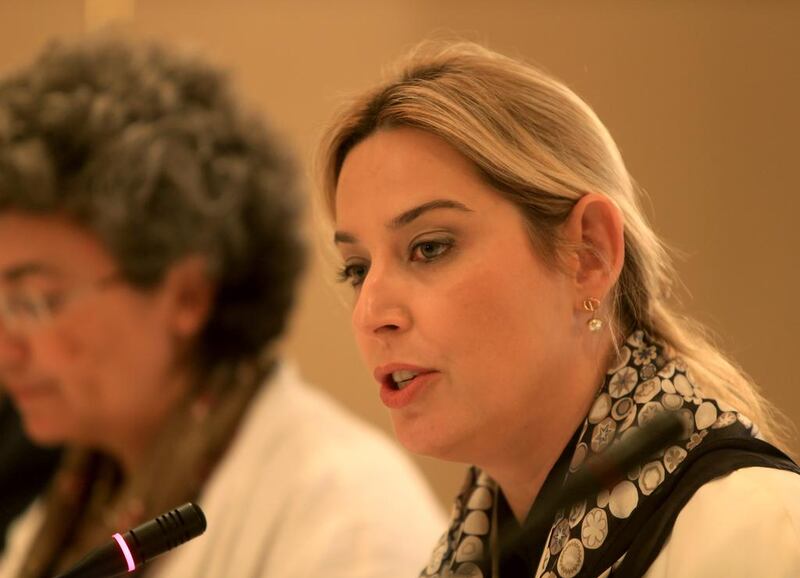ABU DHABI // Judicial officials have responded to the preliminary findings of a United Nations expert invited to investigate the legal system.
Gabriela Knaul, the UN Special Rapporteur on the Independence of Judges and Lawyers, concluded her nine-day official visit on Wednesday. She will now prepare a formal report to the UN Human Rights Council.
In her preliminary observations she said the judicial system had made progress but outlined some of the challenges it still faced.
The Assistant Foreign Minister for Legal Affairs, Dr Abdul Rahim Al Awadi, welcomed the initiative, and said the UAE was in the process of drafting a new federal law on the judiciary.
“The UAE is committed to strengthening the promotion and protection of human rights,” he said.
“We were pleased to engage in a cooperative and constructive dialogue with the Special Rapporteur on the independence of the judicial system in the UAE. The independence of the judiciary is guaranteed by the Constitution of the UAE. Judges, in discharging their duties, are subject to no authority other than the law and their own conscience.
“We have received the preliminary observations of the Special Rapporteur and will consider her comments and recommendations as part of our on-going efforts to strengthen our judicial system and the implementation of human rights.”
He believed some of her preliminary findings were misinformed.
“We regret that some comments of the Special Rapporteur were based on information from undisclosed sources and were consistent with the politically motivated campaign of certain groups to tarnish the reputation of the UAE, making it difficult to evaluate the credibility and impartiality of this information and hence the validity of the issues raised.
“Nonetheless, we will continue to engage constructively with the Special Rapporteur in carrying out her mandate and will carefully consider her report when it is issued.”
Among the recommendations made by Ms Knaul was that all judges should be guaranteed the same working conditions to ensure their independence.
She said if these guarantees could not be met, then all judges should be UAE nationals.
“The prosecution office is composed of 100 per cent local prosecutors. I do not see why the court could not also be 100 per cent nationals,” she said.
Expatriate judges’ tenure and work conditions are not guaranteed in the same way as national judges since they have temporary contracts that are renewed every year, Ms Knaul said.
“My question is how independent they can be if they are not like the national judge who is guaranteed his job until retirement. This may hamper their independence,” she said.
“A clear plan should be designed to accelerate the training and recruitment of more Emirati personnel, men and women, in the judiciary.”
She said progress was being made in this area, as “earlier, 90 per cent were not nationals, today 60 per cent are not national so it is moving forward”.
Ms Knaul also called for equal rights for women in the judicial system. Women were still not perceived as equal before the law and “are still faced with institutional gender discrimination within the administration of justice”, she said.
Another issue she discussed was the alleged torture of defendants, as many claim in court that they have confessed only because they were tortured by police or prosecutors.
She recommended establishing an independent committee of forensics and psychology experts to investigate claims of ill treatment.
“I am concerned that without an independent investigation, the perception that the state violates the fundamental rights of its citizens will undermine the rule of law, the authority of the state and its international image,” she said.
Another area of concern, she said, was that of prosecutors having too much control over criminal proceedings. At present, they are responsible for investigating crimes, issuing arrest and search and seizure warrants, initiating criminal proceedings and enforcing criminal judicial decisions.
They also have a role in monitoring detention centres and in the administration of justice, including disciplinary proceedings against lawyers.
“Such centralisation of power may hamper the independence and fairness of criminal investigations and proceedings,” said Ms Knaul.
She recommended that prosecutors’ functions be revised, with judges issuing warrants and orders.
Mrs Knaul also stressed the importance of having a chance to appeal against verdicts issued by the State Security Court, which at present are final.
“Despite progress, the current judicial system in the United Arab Emirates still faces challenges that directly affect the delivery of justice, the enforcement of human rights and the public’s confidence in the judiciary. Such challenges should not be ignored,” she said.
hdajani@thenational.ae







